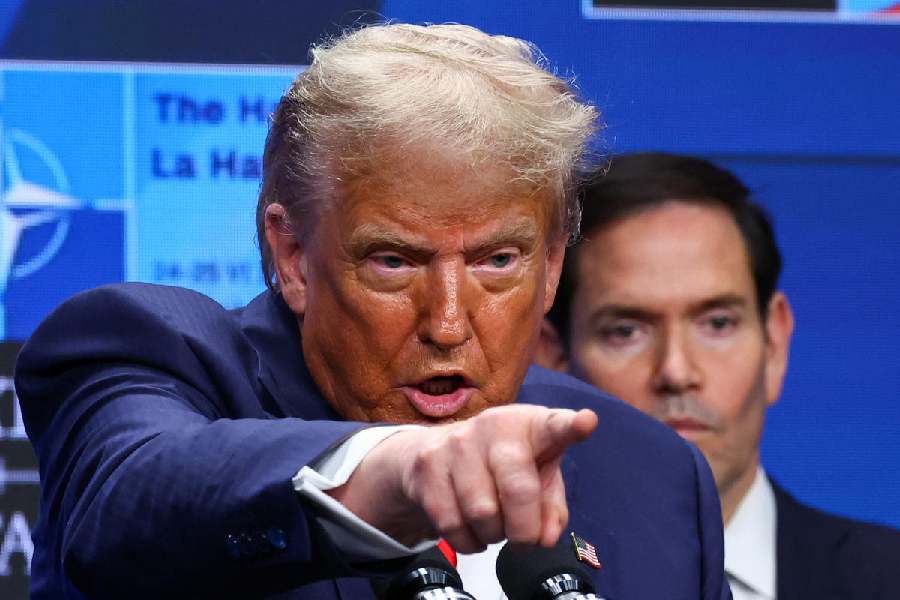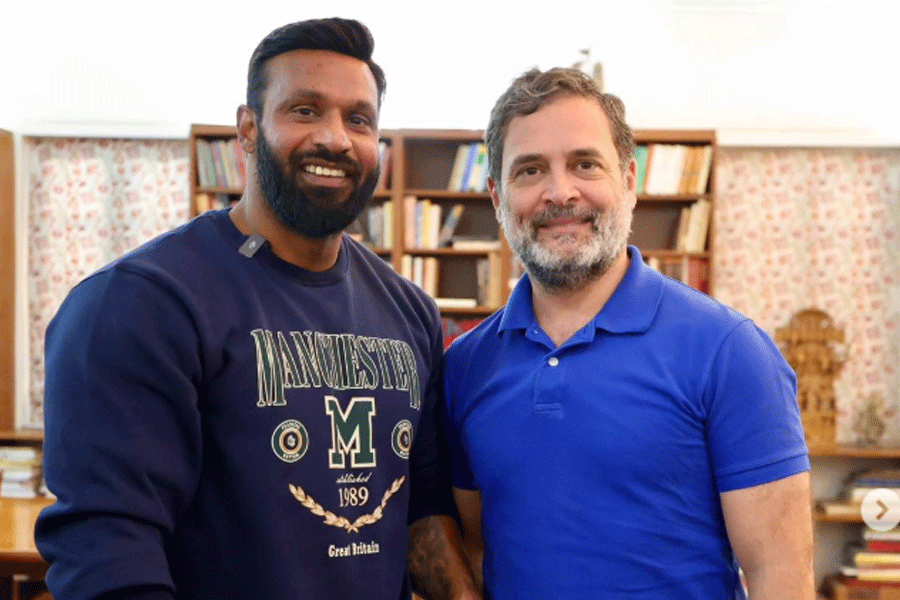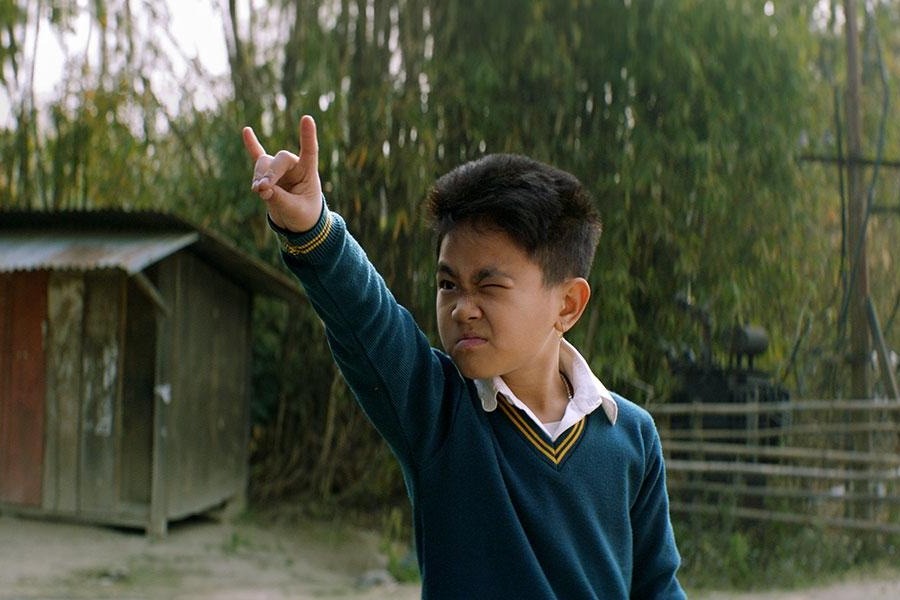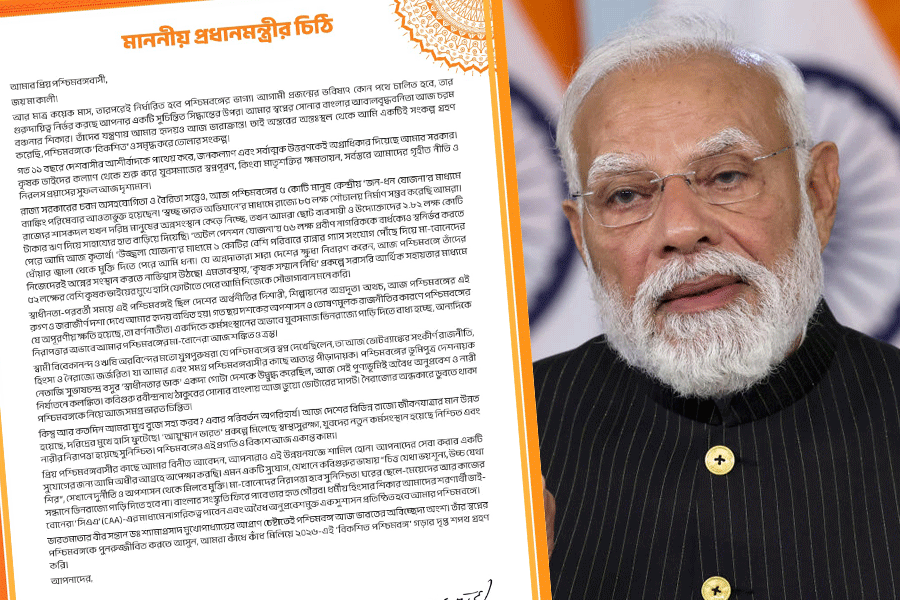Oddly polite
Sir — Donald Trump has a new signature. He has begun ending his digital tirades on Truth Social with “Thank you for your attention to this matter!” This feels like watching a bouncer curtsy after a bar brawl. It is oddly polite, mildly puzzling, and deeply unlike Trump. This sudden turn to bureaucratic pleasantries amid bold claims and all-caps declarations has amused the internet and rightly so. Perhaps the president has discovered the joys of email templates. The contrast between his thunderous proclamations and this prim phrase is delightfully absurd — like a full stop trying to hold back a landslide.
Jahar Saha,
Calcutta
Long shadow
Sir — Fifty years ago, on June 25, India received a rude jolt when the Union government declared a national Emergency, which led to a suspension of constitutional rights and imposed authoritarian rule on the country. Indira Gandhi, the then prime minister, singed by a verdict of the Allahabad High Court that convicted her of electoral malpractices and disqualified her from holding elected office for six years, chose the shroud of the Emergency to stay in office. The Emergency marked a rupture in independent India’s history. The episode tested India’s tryst with democracy. Unlike most other postcolonial nations, it survived the fire, but with scars.
Khokan Das,
Calcutta
Sir — In his article, “Resilient spectre” (June 14), Ramachandra Guha asserts that almost five decades after the Emergency, both authoritarianism and dynastic politics have returned to haunt India, “the only difference being that they are now represented in and by different parties”. No prizes for guessing which party Guha is talking about. The said party, which ridicules the Congress as a “family enterprise”, shamelessly ropes in leaders from dynastic parties as and when it deems fit. The double standards of this party, despite its political posturing, are abominable.
Kajal Chatterjee,
Calcutta
Sir — Authoritarianism can never be vanquished. Politicians try to sway the electorate with their rhetoric. Their speeches are curated to give an illusion of hope. But, all said and done, the Orwellian State always prevails no matter which party comes into power. The Bengali axiom, ‘Je ashe Lankay, sheyi hoy Raban’, is appropriate in this regard. Since Independence, the rise and the fall of various regimes in India prove this point.
Monidipa Mitra,
Calcutta
Sir — The Emergency, declared on June 25, 1975, serves as a stark reminder of the fragility of democracy. We must remain vigilant to protect our freedoms and uphold the rule of law. Let us learn from history and ensure that authoritarianism is never allowed to rear its ugly head in India.
T.S. Karthik,
Chennai
Jokes apart
Sir — I agree with Dev Nath Pathak’s observation that India needs an elaborate education to safeguard humour as a basic human right (“This is no laughing matter”, June 25). The harassment of Ambikesh Mahapatra, a professor of Jadavpur University, for emailing a cartoon of Mamata Banerjee or Manjul, a cartoonist, receiving intimation from X for one of his six-year-old cartoons of the Bengal chief minister, reveals how thin-skinned politicians can be when they are subjected to lampooning.
However, Indians are not an exception when it comes to intolerance of humour. A caricature of Prophet Muhammad by Kurt Westergaard, a Danish cartoonist, had outraged Muslims worldwide. The assassinations of Charlie Hebdo cartoonists in Paris and Mahashay Rajpal, the editor of Rangila Rasul, in Lahore, highlight the global intolerance for humour.
Ajay Tyagi,
Mumbai
Missed chances

Sir — Shubman Gill experienced a humiliating defeat as a debutante captain of the Indian cricket team in the first Test against England (“A chance lost to drops & collapses”, June 25). In a historic first for Test cricket, India lost a match despite five centuries made by batters. England successfully chased down a target of 371 runs to win. Gill’s handling of the bowlers and field placement left a lot to be desired.
Jasprit Bumrah took five wickets in the first innings but went wicketless in the fourth innings as English batsmen successfully repelled India’s star bowler. Yashasvi Jaiswal dropping four catches was unforgivable. As a result, these four English batters — Ben Duckett, Ollie Pope, Harry Brook and again Duckett — went on to score enough runs for England to defeat India.
Bidyut Kumar Chatterjee,
Faridabad
Sir — Although India had a good start in the first Test of the Anderson-Tendulkar Trophy, they could not sustain it till the end. This defeat should be a lesson for the team. The new captain needs to manage the team with the optimal use of the resources at hand. The field placements and bowling changes need to be addressed. For the second Test scheduled to begin on July 2, India should be fully prepared.
Tapan Dutta,
Calcutta










